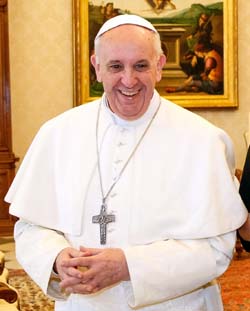In pursuing the Strategy Team discussion after their 24 August meeting by e-mail Clyde made this comment which immediately provoked discussion.
In my view, the main obstacle to reform is a grass roots sense that reform can't happen from the grass roots: it has to come from the top down. People need to know that the simple act of naming injustices and inequalities as experienced at the grass roots is foundational for reform.
Ed replied:
Your writing does not match the upside down pyramid
In my view the main obstacle to reform the church is the stubborn vertical thinking of most of the people in the pews. They would feel very uncomfortable with the horizontal talking in dialogue sessions. So invitations do not help. We will have to participate ourselves in dialogue sessions, start talking about our personal experience of dialogue and drag people from the pews into the benefits of the same experience. The aim is no longer to try to change the institute but to change ourselves and realize that we ourselves can become the church, we want to see.
Clyde,
I hope the ST is seeing the difference. Let us become the church , we want to see
Rene:
I hear you and Clyde saying the same thing. It’s the people who have to change if the church is going to change. Reform is not going to come from the top down. It’s only going to come when the people stop looking at the hierarchy for answers and begin to look within.
Clyde:
That's right. Yes, become the church we want to see.
St. Augustine said much the same thing in his famous summary of the Eucharistic Prayer: "See who you are; be what you see."
The upside-down pyramid is an aspiration that needs initiative from the laity and, in most parish settings, supportive encouragement (for both initiative and maintaining lay independence) from pastors. Since so few pastors are schooled in such support, lay initiative works best in "local gatherings" independent of the parish. It would take a thorough going evangelization effort to win over a lukewarm local pastor.
But, Ed, I think you are right: the emphasis should be not on winning over the local pastor so much as bringing in members of the local parish. Maintaining independence is important.
Ed:
Clyde, You did write it has to come from the top down
If you believe that this generation of bishops will be replaced shortly or that this is not autistic and can be converted by our crying you are right: the Institute itself can only be changed top down. Maybe I was wrong in recognizing the outdated Chitister view in your point.
Clyde:
Ed, What I wrote was "In my view, the main obstacle to reform is a grass roots sense that reform can't happen from the grass roots: it has to come from the top down."
The phrase "it has to come from the top down" is the "grass roots sense".
Rene was correct about our interpretations: they are the same.
I DO NOT BELIEVE that change in the institutional Church "has to come from the top down", and I don't think Francis believes that either. Vatican II (following John Henry Newman's 1859 tract "On Consulting the Faithful in Matters of Doctrine") recognized the role of the "sensus fidelium".
I agree with you that the position of the bishops is "autistic" and cannot be converted "by our crying". Beating drums to a loud voice is not adequate. We need something more.
I think we can arrive at "something more" by the combined pursuit of "local gatherings" toward a "People's Synod". It is locally -- in small communities -- where we are called to "become the church we want to see". We shed light on that phenomenon on our website and celebrate it perhaps more dramatically in a People's Synod.
The Church needs a more robust theology of change, which is why I suggested a "call for papers" that could help inform a "People's Synod".
{jcomments on}
